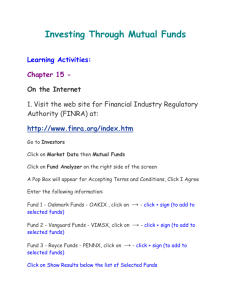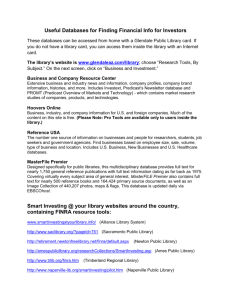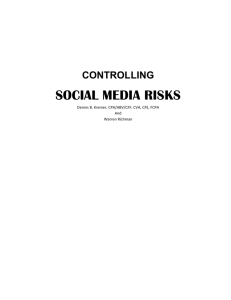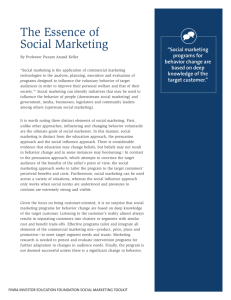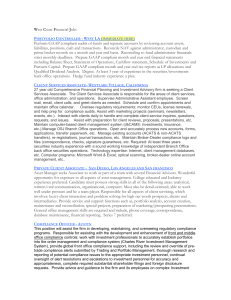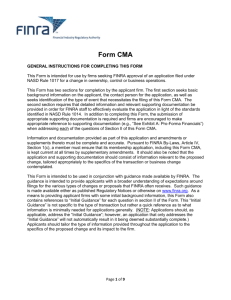Investment Company Products - Cipperman Compliance Services
advertisement
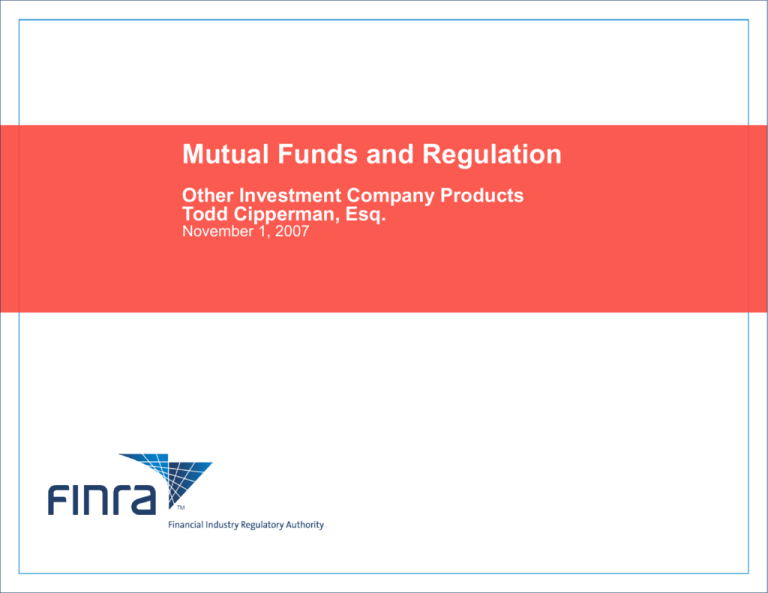
Mutual Funds and Regulation Other Investment Company Products Todd Cipperman, Esq. November 1, 2007 FINRA Disclaimer on content herein: FINRA's classroom learning course information is the sole property of FINRA and the content provided is for informational and educational purposes only. The content of the classroom learning courses does not constitute any FINRA rule or amendment or interpretation to such rules. Compliance with any recommended conduct presented does not mean that a firm or person has complied with the full extent of their obligations under FINRA rules, the rules of any other SRO or securities laws. Use of this classroom learning course does not create a safe harbor from regulatory responsibility. This classroom learning course is provided "as is." FINRA and its affiliates are not responsible for any human or mechanical errors or omissions. Parties may not reproduce the classroom learning courses in any form, nor reference them in any publication, without the express written consent of FINRA. It is important to emphasize that while the particular materials that individual speakers have provided from their firms have been reviewed by FINRA, these may not reflect the express views of FINRA. The regulations and rules are the final authority. Opinions that may be expressed are the opinions of the speakers and participants and not those of FINRA. Mutual Funds and Regulation Confidential Copyright 2007 FINRA 2 1 Other Investment Company Products Other Investment Company Products Closed-End Funds Unit Investment Trusts (UITs) Exchange Traded Funds (ETFs) Variable Insurance Products Section 529 Plans Mutual Funds and Regulation Confidential Copyright 2007 FINRA 4 Closed-End Funds Features: Closed-Ended Funds: – Generally a fixed number of shares is issued – Trade on a Stock Exchange – Shares trade based upon market price rather than net asset value (NAV) With only some relationship to Funds actual NAV Funds sold at POP (not equal to NAV – at a discount or premium to NAV) – As of year-end 2005, total assets in Closed-End Funds was $276 billion (vs. over $8.9 trillion in Open-End Funds) 62% of all assets in Closed-End Funds are held in Debt Securities and 38% were in Equity Funds Open-Ended Funds – Mutual funds continuously issue shares – Mutual funds redeem (buy back) their shares continuously – Redeemability within 7 days (i.e. liquidity). See Section 22(e) (7 days to redeem) and Rule 22c-1 (daily pricing for redeemable securities) See Rule 23c-3 re Interval Funds and quarterly liquidity Mutual Funds and Regulation Confidential Copyright 2007 FINRA 5 Why Closed End Funds “Illiquid Securities” Fund-of-Hedge Funds Emerging Market Funds CDOs etc. Bank loan funds BDCs and private equity Less Cash Drag Lower Costs related to cash management Stability of fees especially performance fees Mutual Funds and Regulation Confidential Copyright 2007 FINRA 6 Disclosure and Regulation Form N-2 Periodic Reporting Obligations of 1934 Act do not apply Section 13 and 16 do apply Repurchases generally effected through periodic tender offers No prospectus updates unless 10b-5 issues Importance of Annual and Semi-Annual reports Financial Statements Registration under 1933 Act, 1940 Act, both, or neither Rule 102 of Regulation M (limitations during distribution period) not applicable Restrictions on multi-class structures Mutual Funds and Regulation Confidential Copyright 2007 FINRA 7 Registration under the Investment Company Act Limits on investment activities Leverage limited to 33% Limits on senior securities Limits on fund-of-funds Compliance requirements Registration Statements Board meetings Affiliate transactions Distribution Compliance Program Cost of registration Liability Mutual Funds and Regulation Confidential Copyright 2007 FINRA 8 Interval Funds (Rule 23c-3) No more often than quarterly No more than 25%/repurchase Cash at NAV Specified time periods for notice and payment Fundamental policies in N-2 Must calculate NAV weekly No CDSCs or 12b-1 fees Majority of Board must be disinterested Mutual Funds and Regulation Confidential Copyright 2007 FINRA 9 Closed-End Fund assets: 1995 - 2006 Mutual Funds and Regulation Confidential Copyright 2007 FINRA 10 Unit Investment Trusts Features: Registered Investment company. Buy & Hold Strategy – Generally buys and holds a fixed portfolio of stocks, bonds, or other securities for a very specific period of time – Positions may be liquidated/replaced due to issuer-viability concerns Dividend income paid ‘regularly’ (quarterly or semi-annually) and interest usually paid monthly – Dividends can be reinvested into “new” Units of UIT’s for Fixed Income UIT’s, or – Dividends can be reinvested into a similar Open-Ended Mutual Fund with the same investment strategy Maturity dates set at issuance. – As short as one year for equity UITs (broker-sold “Dogs of the Dow” UITs) – As long as 30 years for bond UITs Mutual Funds and Regulation Confidential Copyright 2007 FINRA 11 UIT vs. Mutual Fund Static Portfolio: no active management Sponsor maintains secondary market Fixed Term Grantor Trust, rather than RIC, for tax Single offering Sales Charge, low fees Mutual Funds and Regulation Confidential Copyright 2007 FINRA 12 Why a UIT Bond Insurance Specific Market Sectors: “Dogs of the Dow” Secondary Market allows for more liquidity and derivatives Off-Shore investors Asset Allocation ETFs (e.g. SPDRs) No concern about market timing, revenue sharing, etc. Mutual Funds and Regulation Confidential Copyright 2007 FINRA 13 Unit Investment Trusts Advertising Issues: UITs typically cite “estimated current return” in advertisements and sales literature – Defined as estimated net annual interest income per unit, divided by the offering price This is a measure of a trust’s current cash flow For fixed-income UITs the interest paid is usually predictable Fixed-income UITs also may cite estimated long-term return, or estimated yield – Uses weighted average yield to maturity, and reflects impact of sales charges Mutual Funds and Regulation Confidential Copyright 2007 FINRA 14 Exchange Traded Funds (ETF’s) Listed and traded on Stock Exchanges Continuous Trading No discount from NAV Started as institutional cash “equitization” product Hedge funds and short selling More tax efficient: manage capital gains Very inexpensive: Compare ETF vs. Index Fund Available to Non-US investors Fewer regulatory limits on distribution (no revenue sharing issues) No market timing issues Mutual Funds and Regulation Confidential Copyright 2007 FINRA 15 Mutual Funds and Regulation Confidential Copyright 2007 FINRA 16 Structures and Mechanics UITs (e.g. SPDRs, NASDAQ 100, DIAMONDS) vs. Open-End Management Company (e.g. Barclay’s I-Shares, Vanguard VIPERS) Portfolio more fixed; “sampling” of index not allowed Some tax differences Old School vs. New School Creation Units: securities + cash = 22c-1 price “In-kind” transactions Settlement through NSCC guarantees delivery Constant arbitrage among Authorized Participants eliminates discount to NAV Mutual Funds and Regulation Confidential Copyright 2007 FINRA 17 Regulation Need exemptive relief Purchases by 5% holders Separate class of shares differing by redeemabilty (e.g. VIPERS) Secondary market prices rather than NAV Greater than 7-day settlement for non-US securities Prospectus delivery requirements (closed vs. open-end funds) Reimbursement of expenses to UIT sponsor Fund-of-funds 1934 Act: BD activities Regulation M: activities of affiliates during distribution Tender Offer rules Margin Rules Confirmation Rules Section 13 and 16 reporting Conduct Rule 2830(c): sales at other than NAV Mutual Funds and Regulation Confidential Copyright 2007 FINRA 18 ETFs: The New Frontier Actively Managed ETFs Need for arbitrage vs. portfolio returns See SEC Concept Release “Actively Managed Exchange Traded Funds” (2001) Leveraged ETFs Alternative asset classes (e.g. gold-linked ETFs) Search for tax efficiency 401(k) plans Mutual Funds and Regulation Confidential Copyright 2007 FINRA 19 Variable Insurance Products Variable Annuities, Variable Life Insurance Features: Death Benefit, Living Benefit A shares and B shares (See sales practices) Ability to move money among underlying funds Small firm 401(k) marketplace Tax deferral benefits Estate tax planning Mutual Funds and Regulation Confidential Copyright 2007 FINRA 20 Variable Product Legal Issues Fixed grouping of funds under each contract Different funds than offered in retail marketplace Expenses: Loads, Admin, Mortality, Investment, Death Benefit Sold by life insurance agents/registered reps FINRA Conduct Rule 2821: Members' Responsibilities Regarding Deferred Variable Annuities Enhanced suitability requirements that require consideration of surrender charges, fees, and market risks Consider exchanges within the prior 36 months Principal review and approval Procedures and training Sales Practices Mutual Funds and Regulation Confidential Copyright 2007 FINRA 21 Unique Variable Insurance Features Subchapter L requirements for Life Insurance Policies or Annuity Contracts – Because a Trust is used to fund Insurance Contracts, each portfolio must meet certain Diversification requirements > No more than 55% of total value of assets may be represented by one investment > No more than 70% by any two investments > No more than 80% by any three investments > No more than 90% by any four investments No Free Lunch – Variable insurance products generally carry high internal fees Fees cover costs of insurance features and investment management Suitability issue: – Is it cheaper to invest and buy insurance separately? Should there be a per se rule that customer should always get lowest cost (limiting customer choice) Regulatory Scheme Because of dual nature of the products – subject to many levels of regulation – SEC – regulation of offering documents and periodic reporting – FINRA – regulation of sales practices/advertising – State by State – regulation of substantive insurance law and sales practice Mutual Funds and Regulation Confidential Copyright 2007 FINRA 22 529 Plans States Sponsor/Issue the Plans Plans are subject to MSRB regulation on a State-by-State basis Plans generally are managed by professional money managers Tax Advantaged Investment Federal – No deduction on contributions – Earnings grow tax-deferred – Earnings are never taxed when used for education Flexibility Account “owners” retain control over account, not the beneficiary (no conversion at defined age) If beneficiary does not go to college, account can rollover to family member (includes children, nephew/nieces and 1st cousins of original beneficiary) Anyone can contribute to an account Mutual Funds and Regulation Confidential Copyright 2007 FINRA 23 529 Plans College savings plans under IRS Section 529 Contributions federally taxable Many states do not tax contributions to state plans State Plans operated by a professional investment management firm. Earnings in a 529 Plan accumulate tax-free and can be withdrawn taxfree for the purpose of paying for certain qualifying higher education expenses – tuition, room, board, books, etc. Underlying investments generally include mutual funds. Regulation Municipal Securities Rulemaking Board (municipal securities) Reps must have Series 7 or 52 (or Series 6 if the only municipal securities sold are 529 Plans) and must be supervised by a Series 53 or 51, depending on the circumstances. Mutual Funds and Regulation Confidential Copyright 2007 FINRA 24 529 Plan Sales Practices MSRB and FINRA jurisdiction: interest in plan and interests in funds MSRB Rule G-21:no false or misleading advertisements –Consider state tax benefit –Performance data must comply with Rule 482 MSRB Rule G-19: broker-dealer must ensure suitability –FINRA will enforce G-19 (See Ameriprise action) FINRA NtM 03-17: comply with 2210 and other FINRA rules (including pre-filing of marketing materials) MSRB Notice 2007-18: Amendments to G-21: conform performance advertising to 2210 and Rule 482 Mutual Funds and Regulation Confidential Copyright 2007 FINRA 25 529 Plans Account Features You can have multiple accounts for one child Many plans offer age-based or “life-cycle” investment plans that readjust over time from aggressive to conservative based on age of beneficiary Usually cannot change investment selection after initial selection You can rollover between states once per year (and therefore change investment strategy) You could open 2 accounts in 2 states if you wanted to blend investment styles, and change weighting going forward This is the standard current practice Financial Aid 529 is the parents’ asset, so it has less effect than a traditional gift account when applying for financial aid at Colleges Distributions from a 529 plan to pay a child’s expenses will show up in the child’s tax return, and will impact financial aid eligibility in years 2-4 Mutual Funds and Regulation Confidential Copyright 2007 FINRA 26 Summary Closed-End Funds: portfolio liquidity UITs: SPDRs ETFs: low-cost indexing Variable Insurance Products: tax deferral Section 529 Plans: college savings Mutual Funds and Regulation Confidential Copyright 2007 FINRA 27 Todd Cipperman, Esq. Todd Cipperman is the principal of Cipperman & Company, which provides legal consulting services to investment managers, investment advisers, broker-dealers, mutual funds, hedge funds, and technology providers. Cipperman & Company provides a wide range of services for the industry including regulatory advice, product development, distribution arrangements, compliance programs, and client and vendor agreements. Mr. Cipperman has more than 15 years of experience in the investment management and financial services industries. As a principal of Cipperman & Company, he has represented a wide range of investment management clients with a focus on distribution issues facing advisers and broker-dealers. He previously served as general counsel of a public mutual fund and financial technology firm, including its $65 Billion proprietary mutual fund family. He has also served as general counsel of one of the largest international equity managers. He spent several years in private practice on Wall Street representing both buy and sell side clients in investment management and capital markets transactions. He is a graduate of the University of Pennsylvania Law School and Cornell University. 150 S. Warner Road Suite 140 King of Prussia, PA 19406 tcipperman@cipperman.com www.cipperman.com Mutual Funds and Regulation Confidential Copyright 2007 FINRA 28
